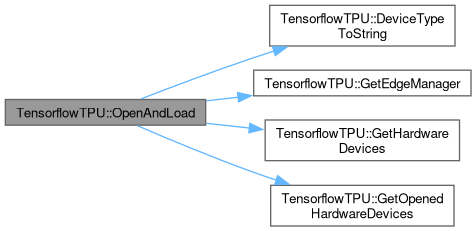Attempt to open the model at the given path and load it onto the EdgeTPU device.
166 {
167
168 TfLiteStatus tfReturnStatus = TfLiteStatus::kTfLiteCancelled;
169 std::vector<edgetpu::EdgeTpuManager::DeviceEnumerationRecord> vValidDevices;
170
171
172 switch (eDeviceType)
173 {
174 case DeviceType::eAuto: m_tpuDevice.type = edgetpu::DeviceType(-1); break;
175 case DeviceType::ePCIe: m_tpuDevice.type = edgetpu::DeviceType::kApexPci; break;
176 case DeviceType::eUSB: m_tpuDevice.type = edgetpu::DeviceType::kApexUsb; break;
177 default: m_tpuDevice.type = edgetpu::DeviceType(-1); break;
178 }
179
180
181 m_pTFLiteModel = tflite::FlatBufferModel::VerifyAndBuildFromFile(m_szModelPath.c_str());
182
183 if (m_pTFLiteModel != nullptr)
184 {
185
186 std::vector<edgetpu::EdgeTpuManager::DeviceEnumerationRecord> vDevices = this->
GetHardwareDevices();
188
189
190
191 for (unsigned int unIter = 0; unIter < vDevices.size(); ++unIter)
192 {
193
194 bool bValidDevice = true;
195
196
197 for (unsigned int nJter = 0; nJter < vAlreadyOpenedDevices.size(); ++nJter)
198 {
199
200 if (vAlreadyOpenedDevices[nJter]->GetDeviceEnumRecord().path == vDevices[unIter].path)
201 {
202
203 bValidDevice = false;
204 }
205
206 else if (eDeviceType != DeviceType::eAuto)
207 {
208
209 if (vDevices[unIter].type != m_tpuDevice.type)
210 {
211
212 bValidDevice = false;
213 }
214 }
215 }
216
217
218 if (bValidDevice)
219 {
220
221 vValidDevices.emplace_back(vDevices[unIter]);
222 }
223 }
224
225
226 if (vValidDevices.size() > 0)
227 {
228
229 for (unsigned int unIter = 0; unIter < vValidDevices.size() && !m_bDeviceOpened; ++unIter)
230 {
231
232 LOG_INFO(logging::g_qSharedLogger,
233 "Attempting to load {} onto {} device at {} ({})...",
234 m_szModelPath,
236 vValidDevices[unIter].path,
238
239
240 m_pEdgeTPUContext = this->
GetEdgeManager()->OpenDevice(vValidDevices[unIter].type, vValidDevices[unIter].path, m_tpuDeviceOptions);
241
242
243 if (m_pEdgeTPUContext != nullptr && m_pEdgeTPUContext->IsReady())
244 {
245
246 tflite::ops::builtin::BuiltinOpResolverWithXNNPACK tfResolver;
247 tfResolver.AddCustom(edgetpu::kCustomOp, edgetpu::RegisterCustomOp());
248
249 if (tflite::InterpreterBuilder(*m_pTFLiteModel, tfResolver)(&m_pInterpreter) != kTfLiteOk)
250 {
251
252 LOG_ERROR(logging::g_qSharedLogger,
253 "Unable to build interpreter for model {} with device {} ({})",
254 m_szModelPath,
255 vValidDevices[unIter].path,
257
258
259 m_pInterpreter.reset();
260 m_pEdgeTPUContext.reset();
261
262
263 tfReturnStatus = TfLiteStatus::kTfLiteUnresolvedOps;
264 }
265 else
266 {
267
268 m_pInterpreter->SetExternalContext(kTfLiteEdgeTpuContext, m_pEdgeTPUContext.get());
269
270 if (m_pInterpreter->AllocateTensors() != kTfLiteOk)
271 {
272
273 LOG_WARNING(logging::g_qSharedLogger,
274 "Even though device was opened and interpreter was built, allocation of tensors failed for model {} with device {} ({})",
275 m_szModelPath,
276 vValidDevices[unIter].path,
278
279
280 m_pInterpreter.reset();
281 m_pEdgeTPUContext.reset();
282
283
284 tfReturnStatus = TfLiteStatus::kTfLiteDelegateDataWriteError;
285 }
286 else
287 {
288
289 LOG_INFO(logging::g_qSharedLogger,
290 "Successfully opened and loaded model {} with device {} ({})",
291 m_szModelPath,
292 vValidDevices[unIter].path,
294
295
296 m_bDeviceOpened = true;
297
298
299 tfReturnStatus = TfLiteStatus::kTfLiteOk;
300 }
301 }
302 }
303 else
304 {
305
306 LOG_ERROR(logging::g_qSharedLogger,
307 "Unable to open device {} ({}) for model {}.",
308 vValidDevices[unIter].path,
310 m_szModelPath);
311 }
312 }
313 }
314 else
315 {
316
317 LOG_ERROR(logging::g_qSharedLogger,
318 "No valid devices were found for model {}. Device type is {}",
319 m_szModelPath,
321 }
322 }
323 else
324 {
325
326 LOG_ERROR(logging::g_qSharedLogger, "Unable to load model {}. Does it exist at this path? Is this actually compiled for the EdgeTPU?", m_szModelPath);
327 }
328
329
330 return tfReturnStatus;
331 }
edgetpu::EdgeTpuManager * GetEdgeManager()
Retrieves a pointer to an EdgeTPUManager instance from the libedgetpu library.
Definition TensorflowTPU.hpp:420
static std::vector< edgetpu::EdgeTpuManager::DeviceEnumerationRecord > GetHardwareDevices()
Retrieve a list of EdgeTPU devices from the edge API.
Definition TensorflowTPU.hpp:361
static std::vector< std::shared_ptr< edgetpu::EdgeTpuContext > > GetOpenedHardwareDevices()
Retrieve a list of already opened EdgeTPU devices from the edge API.
Definition TensorflowTPU.hpp:388
std::string DeviceTypeToString(edgetpu::DeviceType eDeviceType)
to_string method for converting a device type to a readable string.
Definition TensorflowTPU.hpp:445






